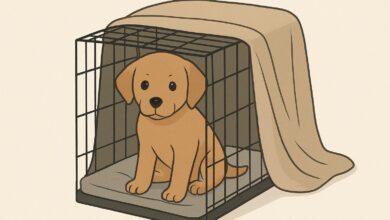How to Stop Dog Barking at Night Proven Tips for Quiet Nights
How to Stop Dog Barking at Night

A dog barking at night can disturb your sleep, worry neighbors, and indicate your dog is uncomfortable or anxious. But silence is not just about convenience — it’s about helping your dog feel safe, calm, and well-cared for. In this guide, you’ll learn what causes night barking, and tried-and-true strategies for how to stop dog barking at night, using simple, positive methods you can implement tonight.
Why Dogs Bark at Night (Understanding the Causes)
Before you try training or fixes, it’s important to know why your dog is barking at night. Some common reasons:
-
Anxiety or fear — noises outside, being alone, unfamiliar surroundings. Soopa Pets+2PangoVet Pet Corner+2
-
Lack of exercise or stimulation — too much energy left over. Pawfectly Yours+3uk.pedigree.com+3holistapet.com+3
-
Need to relieve themselves — bladder or bowel urgency especially before bedtime. Pawfectly Yours+2fauna-care.com+2
-
Discomfort or medical issues — pain, illness, or age-related problems. PangoVet Pet Corner+2uk.pedigree.com+2
-
Attention-seeking — barking because barking worked before to get attention. PawPatron.Org+2blog.petloverscentre.com+2
-
Environmental triggers — noises, lights, animals outside, or exposure to visual distractions. uk.pedigree.com+2fauna-care.com+2
Knowing the cause helps you pick the right strategy How to Stop Dog Barking at Night.
1. Establish a Calm Evening Routine
A predictable, calming routine before night helps your dog wind down. Some key steps:
-
Take them for a walk or play session in the evening to burn energy. holistapet.com+2Pawfectly Yours+2
-
Allow a final bathroom break right before bedtime. Pawfectly Yours+1
-
Feed dinner at a consistent time, not too late. Soopa Pets+1
-
Quiet time afterward: dim lights, soft interaction, no exciting games or loud noises.
2. Create a Comfortable Sleeping Environment
Make your dog’s sleeping space inviting, safe, and free from disturbances:
-
Choose a quiet, dark spot away from street noise or windows where animals walk by. Pawfectly Yours+1
-
Use white noise machines, fans, or soft music to mask sudden sounds. Soopa Pets+2holistapet.com+2
-
Provide a cozy bed, blanket, maybe favorite toy. Crate training can help if done positively. Pawfectly Yours+2PawPatron.Org+2
-
Ensure temperature is comfortable (not too hot or cold).
3. Positive Reinforcement Training
Training helps your dog learn that quiet behaviour at night is rewarded. Some methods:
-
Teach a “Quiet” or “Stop Barking” command: when your dog barks, say the command calmly; when they stop, even if briefly, give praise or a treat. PawPatron.Org+1
-
Reward moments of silence. Don’t wait for long; even a few seconds is enough, then build up. Soopa Pets+1
-
Be consistent: same command words, same rewards. All family members should follow the same rules.
4. Avoid Reinforcing the Barking
Sometimes what feels like help is actually reward for unwanted behavior.
-
Don’t respond to barking with attention (even negative attention can count). If you go to them or yell, the dog might think that’s attention. Pawfectly Yours+1
-
Wait until the dog is quiet, then reward. This teaches that quiet gets results.
-
Avoid giving treats, letting out, or playing right after barking.
5. Manage Emotional Triggers
If barking at night is driven by fear, anxiety, or stress, you’ll need gentle help.
-
Use calming aids: pheromone diffusers, calming treats, or natural aids like lavender. Soopa Pets+1
-
Desensitization: slowly expose the dog to triggers (noise outside, door knocks) at low level, reward calm. Gradually increase so the trigger is no longer scary. fauna-care.com+1
-
If separation anxiety is an issue, try gradually increasing alone time, or sleeping closer to you until more confident to Stop Dog Barking at Night.
6. Check Health and Physical Comfort
Always rule out medical issues or discomfort. Sometimes barking is a symptom.
-
Have a vet examine for pain, infections, bladder issues, joint problems. PangoVet Pet Corner+1
-
For older dogs: cognitive decline can cause disrupted sleep and night barking. Adjust routines accordingly. PangoVet Pet Corner+1
-
Ensure they’re not hungry, thirsty, or bothered by fleas, itching etc.
7. Be Patient and Consistent
Behaviour change takes time. Some tips for staying on track:
-
Track patterns: note when barking happens (time, external noise, after feeding etc.) so you can identify triggers. PangoVet Pet Corner+1
-
Stick with training, routine, and environmental changes even if results are slow.
-
Avoid giving up or reverting to old habits (e.g. sometimes ignoring, sometimes responding can confuse the dog).
8. Consider Professional Help
If you’ve tried many methods and your dog still barks at night, it may be time to get expert help:
-
Certified dog behaviorists or trainer can give a tailored plan.
-
Vet can recommend medical solutions or supplements if anxiety or discomfort is severe.
-
Sometimes training classes with other dogs help socialization and reduce fear of nighttime noises.
FAQ
Q1: Is it okay to ignore my dog when it barks at night?
Yes, if the barking is attention-seeking. But only after you’ve ruled out discomfort or a physical need. Ignoring helps stop reinforcing the behaviour. Just don’t ignore needs like pain or bladder.
Q2: How long will it take to stop night barking?
It varies. Some dogs respond in 1-2 weeks with consistent training; others (especially those with anxiety or older dogs) might take a month or more. Patience is key.
Q3: Can I use anti-bark collars or electronic devices?
They might help in some cases, but they must be humane, not painful. Often they don’t solve the root cause. Use as a last resort, only with guidance from a trainer or vet.
Q4: Should I change my dog’s sleeping location (inside vs outside)?
If your dog sleeps outdoors and barks at night due to noises or being lonely, bringing them indoors or into a quieter space may help. But only if it’s safe and they feel secure.
Q5: Are calming supplements safe?
Many calming drinks, treats, or herbal remedies are relatively safe, but always consult your vet first. Especially if your dog is on medication or has a health condition.


